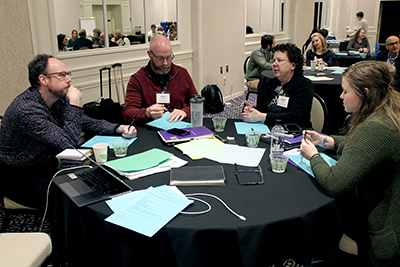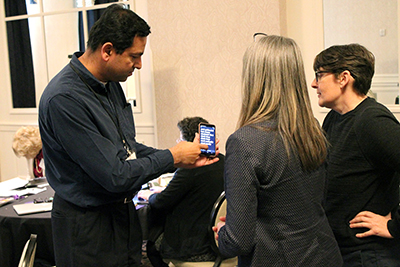Agenda
Wednesday, February 20
7:00–9:00 pm
No-host networking reception

Thursday, February 21
8:00–9:00 am
Breakfast and networking
9:00–10:55 am
Welcome and introductions
Overview of AccessINCLUDES goal, objectives, and activities
Sheryl Burgstahler, University of Washington (UW)
- Universal/inclusive design and other design approaches that lead to inclusive research and practice.
- Video – Equal Access: Universal Design of an Academic Department
10:55–11:15 am
Overview of NSF INCLUDES and the Coordination Hub
Timothy Podkul, SRI International
11:15–11:30 am
Discussion
11:45 am–12:30 pm
Panel Discussion: Experiences of People with Disabilities in STEM Fields
Panelists: Nils Hakansson (Wichita State University), Raja Kushalnagar (Gallaudet University), Marta Larson (Michigan After-School Partnership), Vinod Namboodiri (Wichita State University)
Moderator: Brianna Blaser, UW
12:30–1:15 pm
Lunch and discussion
What can we do to increase the representation of people with disabilities in INCLUDES projects? Why haven’t more INCLUDES projects considered disability?
1:30–2 pm
Report out from lunch and discussion
1:30–3:30 pm
Short presentations: Disability & Accessibility in STEM Fields
- Working Across Disciplines to Improve Digital Accessibility – Jonathan Lazar, University of Maryland, College Park
- Equity by Design – Joan Freese, Twin Cities PBS
- Embedding Neurodivergent Software Design in a CS Course – John Russo, Landmark College
- STEM education and career exposure software for deaf and reading-challenged students – Greg Monty, North Carolina A&T State University
- Digital INaccessibility: Why Haven’t We Figured This Out Yet? – Nora Ryan, Iowa State University
- Strengthening the National STEM Workforce through Accessible and Inclusive Strategic Alignment – Chris Atchison, University of Cincinnati
3:45–4:15 pm
Large group discussion of today’s topics
What resources would be useful to the INCLUDES community in helping them (1) better address disability-related issues, (2) make activities more welcoming and accessible, and (3) develop collaborations that lead to future innovative projects and resources that are inclusive of individuals with disabilities?
4:15–4:30 pm
Evaluation of today’s activities and recommendations for tomorrow
5:30–7 pm
Dinner and discussion
What are barriers and possible solutions individuals with disabilities might encounter within INCLUDES or other STEM research, instruction, and projects?

Friday, February 22
8:00–9:00 am
Breakfast and networking
9:00–9:30 am
Report out on dinner discussion
9:30–10:30 am
Accessible websites, videos, documents, and other materials
Gaby de Jongh, UW
10:45–12:15 pm
Short Presentations: Strategies Used in INCLUDES Projects and Other Broadening Participation Efforts
- Community Engagement for Cradle through Career STEM Learning – Joe Hastings & Kristin Leigh, Explora
- NSF Alliances for Students with Disabilities in STEM – Overtoun Jenda & Brittany McCoullough, Auburn University
- Introducing the Environmental Data Science Inclusion Network – Alycia Crail, Battelle
- Barriers to STEM Learning: Cognitive Loads in the Classroom – Ibrahim Dahlstrom-Hakki, TERC
- Providing Equitable Access to Computing Education in Mississippi – Sarah Lee, Mississippi State University
12:15–1:15 pm
Lunch and discussion
What are examples of collaborations that could be undertaken by stakeholder groups, specific conference participants, and/or other organizations that would support the project goal and objectives?
1:30–2:00 pm
Report out from lunch discussion
2:00–2:30 pm
Action plan: What changes do you plan to make that will lead to the INCLUDES Network being more accessible and welcoming to individuals with disabilities as an individual? As a project? Or in collaboration with others?
2:45–3:00 pm
Videos and other resources
Report out action plans, wrap up, what’s next, and evaluation